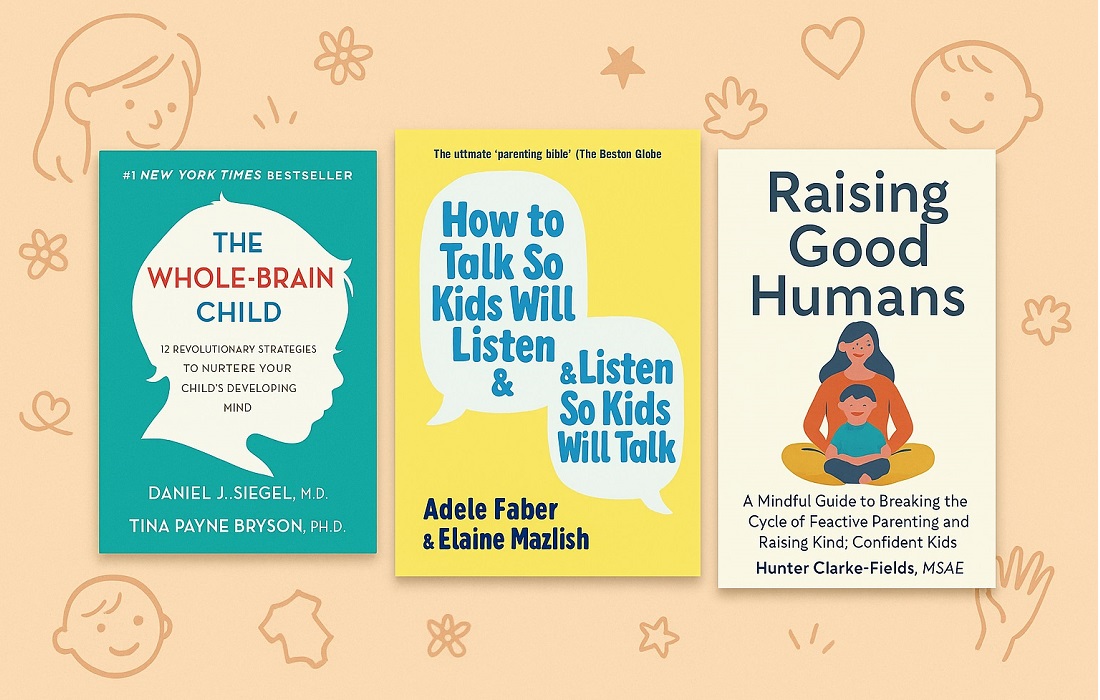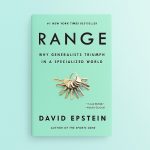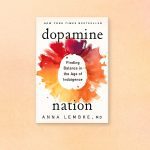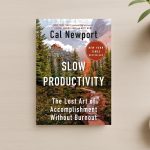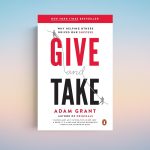Parenting is a lifelong journey that demands patience, adaptability, and an evolving set of skills. Whether raising toddlers, teens, or navigating special challenges, the right guidance can transform stress into confidence. This list of Top 10 Books About Parenting Skills combines New York Times and Amazon bestsellers with timeless guides, offering practical advice backed by research and real-life experience. You’ll discover proven methods for discipline, communication, emotional intelligence, and strengthening family bonds. Each book comes with a concise abstract to help you quickly find the most relevant resource for your parenting style and stage, ensuring you approach child-rearing with purpose, empathy, and lasting impact.
Top 10 Books About Parenting Skills
1. How to Talk So Kids Will Listen & Listen So Kids Will Talk by Adele Faber & Elaine Mazlish

A classic in parent‑child communication, this bestseller offers practical strategies to replace yelling and nagging with respect and cooperation. Faber and Mazlish present real-life scenarios showing how to acknowledge feelings, set limits, and encourage autonomy. Illustrated comics clarify techniques, making them easy to apply. Parents learn how to transform conflict into problem-solving opportunities, validate emotions without coddling, and motivate children through connection rather than fear. This book’s approachable style and proven methods have made it a top choice for decades, empowering caregivers to build trust and mutual respect with children from early years through adolescence.
2. Raising Good Humans by Hunter Clarke-Fields MSAE, Mindful Mama Mentor

This Amazon favorite blends mindfulness with modern parenting science. Clarke-Fields guides readers to break reactive cycles, replacing frustration with presence and empathy. She offers mindfulness exercises, language shifts, and self-awareness tools that help parents regulate their own emotions first-because children mirror our state. The book addresses power struggles, emotional meltdowns, and discipline through a lens of compassion and skillful communication. Short practice sections allow immediate application. By fostering emotional intelligence in both parent and child, this resource equips families to navigate challenges collaboratively, nurturing resilience and kindness while reducing conflict in everyday life.
3. The Whole-Brain Child by Daniel J. Siegel & Tina Payne Bryson
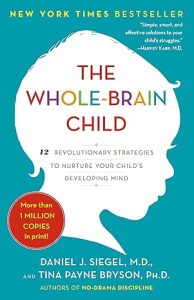
Siegel and Bryson combine neuroscience with practical parenting in this NYT bestseller. Using 12 key strategies, they explain how integrating the “upstairs” (logical) and “downstairs” (emotional) brain helps children develop healthy emotional control. Vivid illustrations and real-life examples make complex concepts accessible. Techniques like “Name It to Tame It” or “Engage, Don’t Enrage” teach parents how to respond to emotional storms constructively. The authors emphasize connection as the path to cooperation, turning everyday conflicts into opportunities for growth. This book empowers parents to cultivate children’s mental wellness, empathy, and problem-solving abilities, laying a strong foundation for lifelong resilience.
4. Parenting with Love and Logic by Jim Fay & Foster Cline
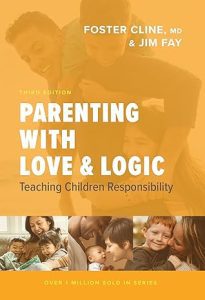
This enduring bestseller teaches how to raise responsible children through empathy and natural consequences. Cline and Fay show how to hand over problem-solving to kids while providing a supportive framework, turning mistakes into learning opportunities. By avoiding lectures and punishments, parents encourage independence and accountability. Real-life examples cover picky eaters, homework battles, and sibling rivalry. Practical tips make it adaptable for toddlers to teens. The approach emphasizes respect, allowing children to feel control over their choices while learning limits. Parents cultivate self-reliance and decision-making skills, reducing power struggles and raising confident, capable young adults.
5. No-Drama Discipline by Daniel J. Siegel & Tina Payne Bryson
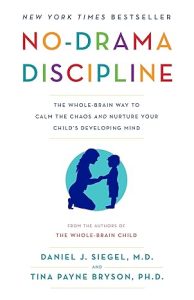
As a follow-up to The Whole-Brain Child, this NYT bestseller reframes discipline as teaching, not punishment. Siegel and Bryson outline how to connect first, then correct, using brain science to guide effective responses. They dismantle myths about strictness and permissiveness, advocating a middle ground of empathy combined with firm boundaries. Examples show how to de-escalate meltdowns, turn misbehavior into skill-building, and strengthen relationships. Visual “discipline potholes” warn against common mistakes. The book’s core message: discipline should develop emotional regulation and understanding, fostering cooperation and mutual respect rather than fear or resentment.
6. Simplicity Parenting by Kim John Payne & Lisa M. Ross
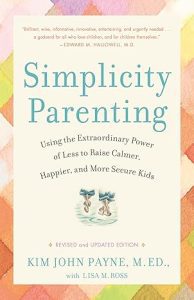
Payne’s philosophy advocates simplifying children’s environment to reduce stress and improve focus. This Amazon bestseller urges parents to declutter toys, limit media, and create predictable rhythms, fostering calm and creativity. The authors argue that over-scheduling and overstimulation undermine emotional well-being. Practical steps help families slow down, prioritize connection, and embrace unstructured play. Case studies reveal transformations in children’s behavior and mood after simplification. This gentle yet powerful approach empowers caregivers to protect childhood’s essential freedoms, enabling kids to grow with resilience, self-confidence, and joy.
7. The 7 Habits of Highly Effective Families by Stephen R. Covey
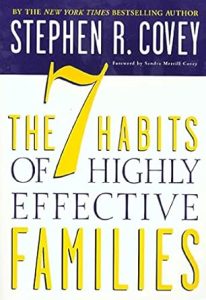
Adapted from his mega-bestseller The 7 Habits of Highly Effective People, Covey’s family-focused guide offers a principle-centered blueprint for building strong, values-driven households. Through personal anecdotes and actionable steps, he encourages families to define shared missions, practice proactive problem-solving, and prioritize “big rocks” like relationships and character. The book blends timeless principles (such as “Seek First to Understand, Then to Be Understood”) with family-specific strategies for communication, trust, and unity. Charts, exercises, and reflection questions make it interactive. This resource helps families face challenges together, align on purpose, and raise children in a culture of respect and cooperation.
+ Review of Book The 7 Habits of Highly Effective People by Stephen Covey
8. Peaceful Parent, Happy Kids by Dr. Laura Markham
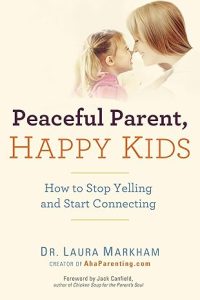
Dr. Markham’s Amazon bestseller offers a three-step approach: regulate yourself, connect with your child, and coach instead of control. She emphasizes empathy, active listening, and emotional coaching to reduce power struggles. By addressing parents’ triggers first, she fosters calmer interactions that model self-regulation. The guidance covers sibling rivalry, tantrums, and bedtime struggles, offering scripts and tools that nurture cooperation. Rooted in attachment theory and positive psychology, the book equips parents to guide behavior without punishment, fostering trust and long-term emotional health.
9. Hunt, Gather, Parent by Michaeleen Doucleff
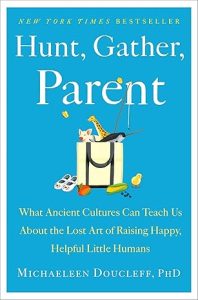
Doucleff, an NPR science reporter, explores parenting wisdom from Indigenous communities in Mexico, Alaska, and Tanzania. She contrasts cooperative, community-based child-rearing with Western approaches, revealing how shared responsibility, autonomy, and respect nurture well-adjusted children. With humor and humility, she shares her own parenting shifts after living alongside these families. This Amazon bestseller blends anthropology, psychology, and hands-on tips, showing parents how to create a harmonious household by fostering independence and reducing parental burnout through cultural insight and practical change.
10. Parenting Matters by National Academies of Sciences, Engineering, and Medicine
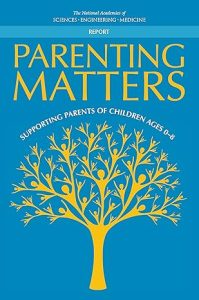
This research-based volume synthesizes decades of studies on effective parenting. Written by a distinguished panel, it outlines core practices-nurturance, consistency, communication, and safety-that support optimal development across social, emotional, and academic domains. The report identifies challenges faced in diverse communities and offers policy recommendations alongside actionable tips for parents. Though scholarly in scope, summaries and examples make it accessible. Its evidence-based insights help caregivers navigate the complexities of raising children in today’s rapidly changing world, grounding decisions in scientific consensus.
Conclusion: Top 10 Books About Parenting Skills
Parenting is both an art and a science. These bestsellers and classic Top 10 Books About Parenting Skills combine neuroscience, communication strategies, cultural perspectives, and mindful living. Together, they equip parents to foster emotional intelligence, resilience, and connection in their children. By applying these tools-whether simplifying daily life, shifting communication, or integrating brain-based techniques-you not only guide your children toward independence and empathy but also strengthen the lifelong bond that makes parenting one of life’s most rewarding journeys.
Tell Us: What Are Your Favorite Books?

